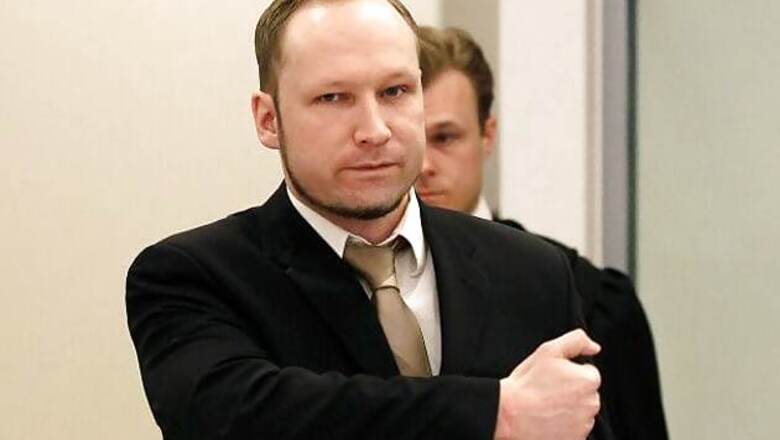
views
Oslo: On the last day of his trial, Anders Behring Breivik's defence lawyers tried to cast the confessed mass killer as a political militant motivated by an extreme right-wing ideology rather than a delusional madman who killed 77 people for the sake of killing.
Since Breivik has admitted to the bomb-and-gun attacks on July 22, the self-styled anti-Muslim militant's mental state has been the key focus of the 10-week trial.
In his closing arguments in Oslo district court Friday, defence lawyer Geir Lippestad reiterated that Breivik accepts that he set off a bomb outside a government high-rise and then gunned down dozens of teenagers at a Labor Party youth camp in the way that the attacks were described in court.
"That little, safe Norway would be hit by such a terror attack is almost impossible to understand," Lippestad said. And that helps explain why psychiatric experts reached different conclusions about Breivik's mental state, he added
Lippestad used his closing arguments to try to prove to the court that Breivik's claims of being a resistance fighter in a struggle to protect Norway and Europe from being colonized by Muslims are not delusional, but part of a political view shared by other right-wing extremists.
He also refuted assertions by one team of psychiatrists that the driving force behind Breivik's attacks was a psychotic impulse to kill, rather than a political ideology.
"July 22 was an inferno of violence," Lippestad said. "But we must also look at how he carried out the attacks to see whether it was violence in itself or radical politics that was the cause."
"He realized that it is wrong to kill but he chose to kill. That's what terrorists do," Lippestad said. "The ends justify the means. You don't understand this if you don't understand the culture of right-wing extremists."
When Breivik talks about a civil war he's not fantasizing about tanks and soldiers in the forest, but referring to a low-intensity struggle he believes will last for 60 years, Lippestad said.
"None of us know what Europe will look like in 60 years," Lippestad said. "Who would have thought 10 years ago that a right-wing extremist party in Greece would get 10 percent in the election now?"
Two teams of psychiatrists reached opposite conclusions about Breivik's mental health. The first team diagnosed him with "paranoid schizophrenia," a serious mental illness. The second team found him legally sane, saying he suffers from a dissocial and narcissistic personality disorder, but is not psychotic.
Prosecutors on Thursday called for an insanity ruling, saying there was enough doubt about Breivik's mental state to preclude a prison sentence.
The five-judge panel is expected to make a ruling in July or August. If deemed mentally competent, Breivik would likely be given Norway's maximum prison term of 21 years. A sentence can be extended beyond that if a prisoner is considered a menace to society. If declared insane, he would be committed to a mental institution for as long as he's considered sick and dangerous to others. Prosecutors suggested Thursday that could mean he would be held for the rest of his life.


















Comments
0 comment